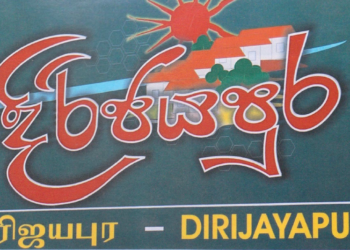By Victor Ivan
Although the group of personssent for the peace talks in Geneva did not include a representative of the JVP, President Mahinda Rajapaksha was able to secure the maximum contribution and the blessings of the hard line Sinhala movements like the JVP and the Hela Urumaya. Even in the selection of the group of rep res en ta tives the wishes of these two forces had been ta ken into account. President’s Counsel H L de Silva is an ideologue of the unitary state. He does not recognize a Tamil nation, a Tamil home land or a Tamil right to self determination. He is also totally against a federal system of government. Senior lawyer Gomin Dayasri too is a person trusted and respected by the JVP and the Hela Urumaya. He is the son of N Q Dias, founder of the Buddhist Commission which had a decisive effect on Bandaranaike’s triumph in 1956.
This programme of discussion may be called a healthy attempt to move forward without antagonizing the forces like the JVP and the Hela Urumaya and to enlist their cooperation to the maximum. An operational council too was formed for the purpose of observing from the Temple Trees the discussions held in Geneva after the group selected for the peace talks had gone there, and for the purpose of giving the discussants the advice necessary. The group included the leaders of the JVP like Somawansa Amarasinghe and Wimal Weerawansa as well as the leaders of Hela Urumaya like Champika Ranawaka. The President’s strategy seems to have been to get all of them to become direct or indirect partners in the peace process.
President’s Counsel H L de Silva had prepared a special paper to show that the ceasefire agreement does not accord with the prevailing law, and the aim of that paper was to amend the ceasefire agreement by deleting the parts which did not accord with the law of the land. It is clear that the L TIE delegation, which may be considered a more experienced group than the delegation sent by the government for the peace talks, had come there well prepared to face the government strategy.
The leader of the LITE delegation declared emphatically that they did not accept the law of the land and that they were not prepared to see or discuss what is prevailing in the law because they had done and were doing everything on the basis that they did not recognize the law of the land.
It is not possible to analyze or solve this crisis within the framework of the existing law. The LITE considers the existing state as a Sinhala state and rejects its legitimacy. Therein lies the essence of the prevailing crisis. Under the prevailing law of the land an armed rebellion against the existing state is illegal. However, disregarding that fact, they are conducting a protracted armed struggle. They have established an area of administration of their own, three armed forces of their own, a police, a system of law courts and a system of administrative establishments of their own. It amounts to the existence of a shadow state that does not recognize the authority of the prevailing state. The state made a number of attempts at the maximum level to destroy that shadow state which had arisen contrary to the prevailing law, but failed. Now the prevailing state wants to negotiate with the shadow state in order to achieve that aim by different means. The state will be able to achieve that aim either by absorbing that shadow state into the state in a way that will suit the aspirations of the Tamil people, or by creating a new state in place of the two existing states.
If the problems are to be solved within the law prevailing in the country, either the L TTE must lay down their arms and recognize the legitimacy of the state, or the state must put an end to their shadow state by a war against them. It has become necessary to solve the problems through negotiation because the LTTE is not following a policy of succumbing willingly, and it has become impossible to undermine it by military means. Consequently it will not be possible to solve this dispute through H L de Silva’s legal approach.
At the conference table the L TIE was able to defeat the government’s approach because the approach of the government delegation was not realistic. There cannot be any doubt that the government should not be servile in the presence of the L TIE. However the ceasefire agreement cannot be altered without the cooperation of the LTTE. The government delegation should have fashioned their approach to the negotiations to suit that reality. Due to a policy of disregarding that fundamental reality the government delegation had to give up the militant stand that they had adopted at the beginning.
According to the agreement now reached by the two sides, the L TTE must give up recruiting child soldiers. The child soldiers already recruited must be handed over to their parents or guardians. On the other hand, the government of Sri Lanka must disarm the anti-LTTE factional armies (Karuna faction).
The second round of the peace talks is to be held in Geneva on April 19-21. The time available is two months. Within those two months both the parties will have to fulfil the requirements agreed upon. The second round of the peace talks will be successful only if the conditions agreed on are fulfilled.





